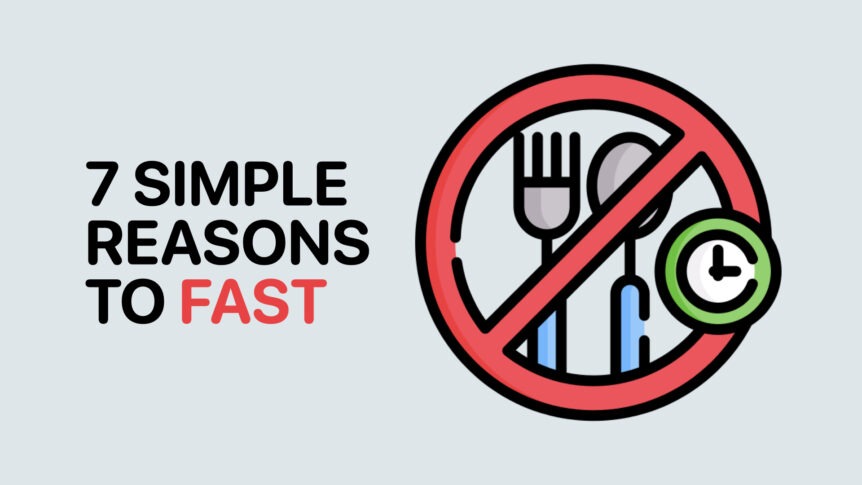Let’s be honest. Fasting is not a popular spiritual discipline for most Christians. Some people see fasting as an outdated, pious ritual that was only practiced by the most devout people of God. Others see the benefit of fasting purely for personal health benefits.
What is fasting? And why should we fast today?
What may come as a surprise, is there is actually no biblical command to fast. It’s not listed in the Ten Commandments. It’s not part of the moral law, civil law, or ceremonial law. It seems rather odd that zero times in the Bible does God specifically command His people to fast.
However, people fasted…
…and they fasted often!
There are numerous examples of people purposefully choosing to not eat food in order to pursue a higher purpose—which is a great explanation of what fasting is.
Fasting is a break from something necessary to pursue something more necessary.
In the Bible, fasting was never aimless. It always served a purpose. Fasting wasn’t simply about not eating food. It was about pursuing something greater in the place of food. Fasting was a way to pursue the Spirit in place of the flesh, pursue the eternal in place of the temporary, and pursue God’s will over our own desires.
Here are seven reasons people fasted in Scripture. As you read them, perhaps the Lord will stir in your heart a reason for you to fast.
1. To Seek God’s Presence
Daniel 9:3 “So I turned my attention to the Lord God to seek him by prayer and petitions, with fasting, sackcloth, and ashes.”
Daniel lived in a culture driven by the pursuit of selfish desires. The Babylonian Empire was a harsh, self-gratifying, God-hating culture. Daniel intentionally guarded himself from being conformed to the culture.
So Daniel fasted.
Daniel was hungry for God. He desired to walk in His presence and live by His commands, so fasting from food was his way of pursuing God’s life-giving presence.
2. To Ask for God’s Protection
Ezra 8:21 “I proclaimed a fast by the Ahava River, so that we might humble ourselves before our God and ask him for a safe journey for us, our dependents, and all our possessions.”
Ezra was the leader God used to prepare the people to return to Israel after the Exile. Traveling with a large group from Assyria to Jerusalem would be dangerous. Further, Ezra didn’t want to ask the king for protection along the journey. The king would have easily had the government resources to send a cavalry unit to provide assistance.
However, Ezra wanted God to be their source of protection, not the Assyrian government.
So Ezra fasted.
And all the people fasted. They used the time to pray and ask God to protect them as they journeyed back to their homeland. Here’s how Ezra records the end of that story. “We were strengthened by our God, and He kept us from the grasp of the enemy and from ambush along the way” (Ezra 8:31).
3. To Seek a Breakthrough.
1 Samuel 1:7 “Year after year, when she went up the Lord’s house, her rival taunted her in this way. Hannah would weep and would not eat.”
Hannah was barren. Not being able to have children was a heavy burden to carry. To make matters worse, her husband had another wife who did have children—and she wasn’t afraid to rub it in Hannah’s face.
Hannah longed for a child.
So she fasted from food.
When they made the annual trip to the temple to offer sacrifices, Hannah chose not to eat. She prayed diligently for God to provide a breakthrough. This situation was beyond her control and her understanding. She was desperate for God to intervene.
God did.
Hannah eventually gave birth to Samuel, and she turned around and gave her son back to the Lord. God would use Samuel to be one of the greatest prophets and priests to serve the nation of Israel.
4. To Grieve a Situation.
Nehemiah 1:4 “When I heard these words, I sat down and wept. I mourned for a number of days, fasting and praying before the God of the heavens.”
Nehemiah, like Ezra, lived during a time after the exile when Israel began returning back to their homeland. However, things were definitely not like they left them. Nehemiah got a status report on the condition of the beloved city of David, Jerusalem. The walls surrounding the city were in shambles.
This was shameful, unbearable, and dreadful. The city was completely exposed to attack.
Nehemiah grieved.
Nehemiah fasted.
When we fast and grieve over a situation, it shows how important the issue is to us. Often, when people lose a loved one, they completely lose their appetite for a few days. Food can be a comfort, and during times of sadness, it’s OK if we choose not to be comforted by food so we can be comforted by God.
5. To Confess Sin.
Nehemiah 9:1-2 “On the twenty-fourth day of this month the Israelites assembled; they were fasting, wearing sackcloth, and had put dust on their heads. Those of Israelite descent separated themselves from all foreigners, and they stood and confessed their sins and the iniquities of their ancestors.”
After completing the wall around Jerusalem, Nehemiah had the law of God read aloud before the people. It was a way of reminding everyone of the standard God had set before them. Upon hearing God’s instructions, I’m sure it was very convicting as they began to realize all the ways they fell short of God’s standard.
Before they celebrated the completion of the wall with feasting and drinking, they sought the Lord together.
They fasted and confessed their sin.
Fasting is a great opportunity to confess our sins before God. It’s owning our faults and shortcomings and redirecting our thoughts and lives toward Him. There is a time for feasting and celebrating, but there is also a time for fasting and confession.
6. To Prepare for Ministry.
Matthew 4:2 “After he had fasted forty days and forty nights, he was hungry.”
Before Jesus began His public ministry, he fasted for forty days and nights. He spent that time alone with God in the wilderness. The following three years of his life would be exhausting. He would be pulled and tugged in every direction to teach, serve, answer questions, resolve conflicts, and shape the disciples who would, in turn, shape the world. Not to mention, Jesus was ultimately heading to the cross.
It was a monumental, God-sized task.
So Jesus fasted.
He didn’t rush into ministry but instead spent a month and a half alone with His Father, being renewed, equipped, and empowered for what lay ahead.
If Jesus needed this time, how much more do you and I? Before we jump into the next ministry or quickly start the next outreach program, let’s pause to spend time with the Father and fill up on His strength.
7. To Discern God’s Will.
Acts 13:2 “As they were worshiping the Lord and fasting, the Holy Spirit said, “Set apart for me Barnabas and Saul for the work to which I have called them.”
The early church was growing quickly as the news of Jesus began to spread all over the region. God has a mission, and He uses His church to accomplish His mission. The church in Antioch was having your typical gathering together, encouraging each other in the Gospel message. However, during this particular worship service, the Lord guided them to send out Barnabas and Saul.
God was doing big things, and the church fasted.
Fasting is not a magical recipe to discern God’s will. However, when you take the time to stop pursuing food for your stomach and start pursuing food for your soul, it’s amazing how much clearer God’s voice becomes.
Do you need to hear the voice of God?
Perhaps there’s some noise you can turn down in your life to better hear how God is speaking to your heart.

